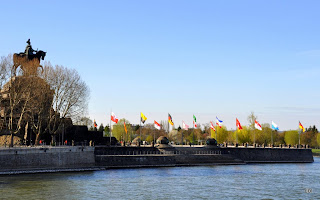After leaving Koblenz we sailed through the wind country along the Mosel River. Here we are passing the picturesque town of Cochem.
The Reichsburg Castle looms over Cochem. I was standing behind a double-paned glass window when I took this photo. It produced a ghost image that I think is kinda cool.
Past extensive vineyards.
The lovely town of Zell.
Hilltop villages.
Walking through the vineyards.
Approaching Traben-Trarbach
Grevenburg castle overlooking Traben-Trarbach
The Buddha Museum, built by a local convert to Buddhism.
The "River Harmony" -- our home during the tour.
We were tied up opposite these dramatic sandstone cliffs. They make for a nice picture.
The Reichsburg Castle looms over Cochem. I was standing behind a double-paned glass window when I took this photo. It produced a ghost image that I think is kinda cool.
Past extensive vineyards.
The lovely town of Zell.
Hilltop villages.
Walking through the vineyards.
Approaching Traben-Trarbach
Grevenburg castle overlooking Traben-Trarbach
The Buddha Museum, built by a local convert to Buddhism.
The "River Harmony" -- our home during the tour.
We were tied up opposite these dramatic sandstone cliffs. They make for a nice picture.

























































